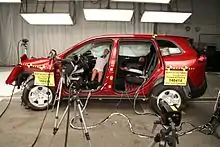Out of position (crash testing)
Out of position (OOP), in crash testing and car accident medical literature, indicates a passenger position which is not the normal upright and forward-facing position.[1] For example, a common case observed in crashes is the position of an occupant when reaching for the car radio,[2] or panic braking in unbelted passengers.[3] The concept is of interest because small changes in a passenger's position can have profound effects on the actual kinematic response, especially in rear impacts, as shown both in practical testing and theoretical models.[1]

Risk of injury
Out of position occupants are at increased risk of injury. Even low speed impacts can cause disc herniation and lumbar fracture on OOP passengers.[2] Airbags can prove fatal on OOP passengers:[4][5][6] modulating the airbag folding pattern has been proposed as a method to reduce injuries.[7] Crash testing has shown increased forces acting on the neck and torso when dummies were leaning forward and not upright; a partial correlation with the seat stiffness has been observed, with stiffer seats increasing the force loads on the upper neck.[8]
References
- Stephen M. Foreman; Arthur C. Croft (2002). Whiplash Injuries: The Cervical Acceleration/Deceleration Syndrome. Lippincott Williams & Wilkins. pp. 104–. ISBN 978-0-7817-2681-8. Retrieved 8 December 2012.
- Larry S. Nordhoff (2005). Motor Vehicle Collision Injuries: Biomechanics, Diagnosis, And Management. Jones & Bartlett Learning. pp. 513–. ISBN 978-0-7637-3335-3. Retrieved 8 December 2012.
- Society of Automotive Engineers (1 March 2004). Air bags and belt restraints. Society of Automotive Engineers. ISBN 978-0-7680-1412-9. Retrieved 8 December 2012.
- Michael Griebel; Marc A. Schweitzer (2003). Meshfree Methods for Partial Differental Equations. Springer. pp. 249–. ISBN 978-3-540-43891-5. Retrieved 8 December 2012.
- Hans-Joachim Bungartz; Michael Schäfer (14 September 2006). Fluid-Structure Interaction: Modelling, Simulation, Optimisation. Springer. pp. 101–. ISBN 978-3-540-34595-4. Retrieved 12 December 2012.
- Mary Roach (17 May 2004). Stiff: The Curious Lives of Human Cadavers. W. W. Norton & Company. pp. 93–. ISBN 978-0-393-32482-2. Retrieved 12 December 2012.
- Malczyk, A; Adomeit, H-D (1995). "THE AIRBAG FOLDING PATTERN AS A MEANS FOR INJURY REDUCTION OF OUT-OF-POSITION OCCUPANTS". Proceedings of the 39th Stapp Car Crash Conference, November 8-10, 1995, San Diego, California, USA (SAE Technical Paper 952704): 19035. Retrieved 7 December 2012.
- Benson, B.R.; Smith GC; Kent RW; Monson CR (November 1996). "EFFECT OF SEAT STIFFNESS IN OUT-OF-POSITION OCCUPANT RESPONSE IN REAR-END COLLISIONS". Proceedings of the 40th Stapp Car Crash Conference, November 4-6, 1996, Albuquerque, New Mexico, USA (SAE Technical Paper 962434): 331–44.